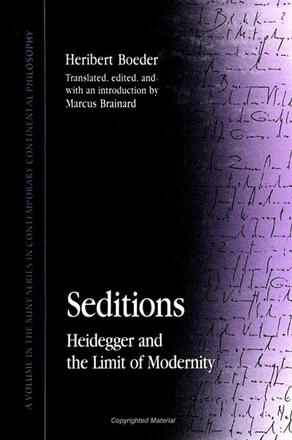
Seditions
Heidegger and the Limit of Modernity
Alternative formats available from:
Description
This is the first book-length work by Heribert Boeder to appear in English. The essays brought together here, several of which are to be found only in this volume, bear witness to a new perspective on metaphysics, modernity, and so-called postmodernity. The "seditiousness" of Boeder's undertaking lies in his twofold intention: to explicate what has been thought in metaphysics, modernity, and postmodernity as self-contained, rational totalities--as history, world, and speech, respectively--and by means of those explications to recover dwelling as it has been made visible in the "configurations of wisdom" (for example, in Homer, Paul, and Holderlin). He approaches each of these totalities by way of Heidegger's thought, which marks the limit of modernity and as such is pivotal to Boeder's enterprise.
Heribert Boeder is Professor Emeritus of Philosophy at the University of Osnabruck, in Germany. He is the author of Grund und Gegenwart als Frageziel der fruh-griechischen Philosophie (Ground and Present as the Aim of Early Greek Philosophical Inquiry), Topologie der Metaphysik (Topology of Metaphysics), Das Vernunft-Gefuge der Moderne (The Rational Architectonic of Modernity), and Das Bauzeug der Geschichte (The Constructive Elements of History). Marcus Brainard is a doctoral candidate in philosophy at the University of Osnabruck.
Reviews
"The most important philosophical thinking since Heidegger is the work of Heribert Boeder. Like his teacher Heidegger, Boeder has devoted his life to a sustained rethinking of the history of philosophy with constant attention to the relation between philosophy's ancient beginnings and its present destitute condition. But what emerges from Boeder's study is a critical reassessment of Heidegger's reading of philosophy's beginnings and development that demonstrates the accomplishments of philosophy in the pursuit of its necessary, lawful, and logical task. The essays collected in Seditions exhibit the stages in the development of Boeder's thinking and form an excellent overview of his work. Marcus Brainard's introductory essay is extremely good at alerting the reader to the character of Boeder's debt to and departures from Heidegger's thinking. " -- Joseph Fell, Bucknell University
"Anyone preoccupied by the question of what it means to think 'after' Heidegger should study this volume. Few, if any, share Boeder's mastery of the Occidental tradition, but for all his profundity and meticulousness he wears his learning so lightly that the uninitiated, with the help of a discerning introduction by Marcus Brainard, will welcome this selection of essays as a breath of fresh air. " -- Robert Bernasconi, University of Memphis